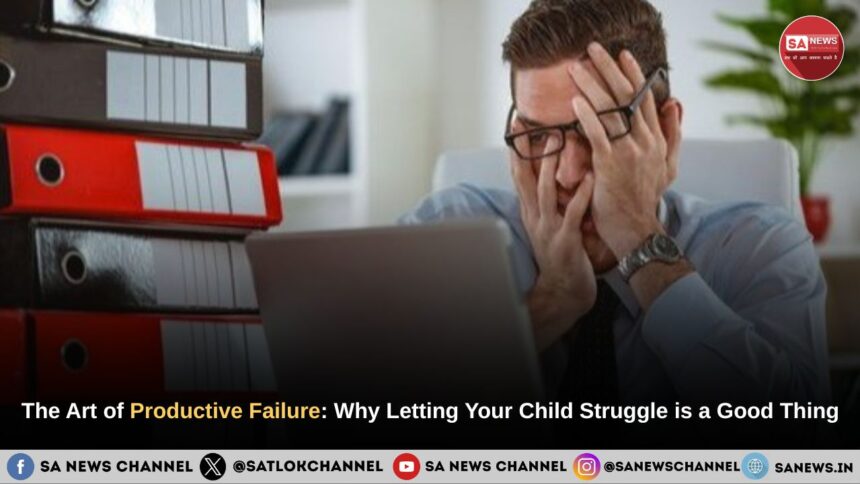In today’s fast-paced, achievement-driven world, parents often feel compelled to shield their children from setbacks. However, a growing body of research suggests that allowing kids to struggle—through a concept called productive failure—can foster resilience, critical thinking, and long-term success. This article explores why letting your child face challenges is not only beneficial but essential for their growth, backed by expert insights and practical tips for parents.
- What is Productive Failure?
- Why Letting Your Child Struggle Matters
- 1. Builds Resilience and Grit
- 2. Enhances Problem-Solving Skills
- 3. Promotes a Growth Mindset
- 4. Prepares for Real-World Success
- How Parents Can Foster Productive Failure
- Common Misconceptions About Productive Failure
- The Role of Schools in Productive Failure
- Raising Resilient Kids with Productive Failure and Spiritual Guidance
- Frequently Asked Questions (FAQs) on Productive Failure
What is Productive Failure?
Productive failure is an educational and parenting approach where children are encouraged to tackle problems independently, even if they initially fail. Unlike traditional failure, which may discourage effort, productive failure emphasizes learning through trial and error. Dr. Manu Kapur, a leading researcher in this field, describes it as a process where “struggling with a problem without immediate success can lead to deeper understanding and skill development.”By allowing kids to grapple with challenges, parents and educators create opportunities for creative problem-solving and perseverance.
This method contrasts with overprotective parenting, where immediate solutions are provided, potentially stunting a child’s ability to develop grit.
Why Letting Your Child Struggle Matters
Letting children face obstacles without immediate intervention has several proven benefits. Here’s why productive failure is a game-changer for child development:
1. Builds Resilience and Grit
Struggling through challenges teaches children to bounce back from setbacks. According to a 2023 study from the Journal of Child Psychology, children who experience controlled failure in safe environments develop stronger emotional resilience. This prepares them for real-world adversities, from academic pressures to personal challenges.
2. Enhances Problem-Solving Skills
When kids work through problems independently, they learn to think critically and creatively. Productive failure encourages them to explore multiple solutions, fostering innovation. For example, a child struggling with a math problem may discover alternative approaches, deepening their understanding.
3. Promotes a Growth Mindset
Psychologist Carol Dweck’s research on growth mindset highlights that children who view challenges as opportunities to learn are more likely to succeed. Productive failure reinforces this mindset by showing kids that effort and persistence lead to improvement, not just innate talent.
4. Prepares for Real-World Success
Life is full of obstacles, and shielding children from failure can leave them unprepared. Productive failure equips kids with the tools to navigate uncertainty, a skill highly valued in professional and personal settings.
How Parents Can Foster Productive Failure
Implementing productive failure at home requires a balance between guidance and independence. Here are practical strategies to help your child learn through struggle:
- Resist the Urge to Fix Problems Immediately: When your child is stuck on a task, give them time to explore solutions before stepping in. For example, if they’re struggling with a puzzle, ask guiding questions like, “What have you tried so far?”
- Create a Safe Environment for Failure: Ensure your child knows that mistakes are part of learning. Praise effort over results to build confidence.
- Encourage Reflection: After a challenge, ask your child, “What did you learn from this?” This promotes self-awareness and critical thinking.
- Model Resilience: Share stories of your own struggles and how you overcame them to normalize failure as a growth opportunity.
- Set Realistic Challenges: Provide tasks that are slightly above your child’s current skill level to encourage growth without overwhelming them.
Common Misconceptions About Productive Failure
Some parents worry that allowing their child to struggle may harm their self-esteem or academic performance. Let’s address these concerns:
- Myth 1: Failure Damages Confidence
When handled correctly, failure builds confidence by showing kids they can overcome challenges. The key is to frame failure as a learning opportunity, not a reflection of worth. - Myth 2: Immediate Help is Always Best
Providing instant solutions can undermine a child’s ability to develop independence. Productive failure prioritizes long-term growth over short-term comfort. - Myth 3: Productive Failure Means No Guidance
This approach doesn’t mean abandoning your child. It involves strategic support, such as asking questions or providing hints, to guide them toward solutions.
The Role of Schools in Productive Failure
Educators also play a critical role in fostering productive failure. Progressive schools are adopting this approach by designing curricula that encourage exploration over rote learning. For instance, project-based learning allows students to tackle real-world problems, often failing multiple times before succeeding.
Also Read: Why Failure Portfolios Are the New Resume: A Smarter Way to Get Hired
Teachers can support this by creating a classroom culture that celebrates effort and iterative learning.Parents can advocate for these methods by discussing productive failure with teachers and school administrators. Look for programs that emphasize critical thinking, collaboration, and resilience.
Raising Resilient Kids with Productive Failure and Spiritual Guidance
Productive failure teaches us that real growth often comes from challenges, not comfort. Similarly, Sant Rampal Ji Maharaj explains in his spiritual discourses that human life itself is a journey of struggles designed to awaken wisdom and resilience. Just as parents should not rush to solve every problem for their children, God too allows us to face difficulties so we can learn, reflect, and ultimately seek the true path.
According to Sant Rampal Ji Maharaj, real success in life comes not from avoiding struggles, but from gaining the right guidance from an enlightened saint that transforms hardships into stepping stones toward liberation. By applying this approach in parenting and life, we empower children and ourselves to build resilience, critical thinking, and spiritual strength for long-term success and eternal peace.
Frequently Asked Questions (FAQs) on Productive Failure
- What is productive failure in parenting?
Productive failure is an approach where parents let kids struggle with challenges to foster learning, resilience, and problem-solving skills through trial and error.
- Why is productive failure good for kids?
It builds resilience, enhances critical thinking, and promotes a growth mindset, preparing children for real-world challenges and long-term success.
- How can parents encourage productive failure?
Parents can resist fixing problems immediately, create a safe space for mistakes, and ask guiding questions to help kids learn from challenges.
- Does productive failure harm a child’s confidence?
No, when framed as a learning opportunity, productive failure boosts confidence by showing kids they can overcome obstacles with effort.
- How do schools use productive failure?
Schools adopt project-based learning and encourage exploration, allowing students to fail safely while developing critical thinking and resilience.









